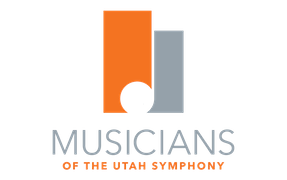The Utah Symphony: a brief history
Founded in 1940, the Utah Symphony is one of America’s major symphony orchestras, known internationally for its distinctive performances and recording legacy. A leading cultural organization in the Intermountain West, the Utah Symphony has a rich history of international and domestic tours, award-winning recordings, and in-depth educational programs. Today, the orchestra’s 85 full-time professional musicians perform over 175 concerts each season.
The Utah State Symphony Orchestra gave its first concert in Salt Lake City on May 8, 1940, conducted by Hans Henriot. Henriot lead the orchestra as Music Director until the end of World War II, followed by the brief tenure of Werner Janssen (1946–1947). The orchestra’s name was officially changed to the Utah Symphony in 1946.
The Utah Symphony became recognized as a leading American ensemble largely through the efforts of Maurice Abravanel, its Music Director from 1947 to 1979. During his tenure, the orchestra undertook four international tours, released over 100 recordings and developed an extensive music education program.
Included in the Utah Symphony’s discography with Abravanel are première recordings of works by Honegger, Milhaud, Rorem, Satie, Schuman, and Varèse. A pioneering cycle of Mahler Symphonies was recorded between 1963-1974 which included the first commercial stereo recordings of the Seventh and Eighth Symphonies. The Utah Symphony’s recordings of Mahler’s symphonies with Maurice Abravanel were the first complete cycle recorded by an American orchestra (Vanguard). Honors for Abravanel’s Mahler recordings with the orchestra include the “Mahler Medal of Honor” from the Bruckner Society of America (1965) and the International Gustav Mahler Society award for “Best Mahler Recording” (Fifth Symphony, 1975). As a result of his Mahler recordings with the Utah Symphony, Abravanel was made an honorary member of the International Mahler Society of Vienna (1966). Other distinguished recordings include cycles of symphonies by Brahms and Sibelius, and the complete orchestral works of Tchaikovsky.
Touring played a significant role in Abravanel’s legacy with the orchestra. In the years between 1966-1977, they traveled to 16 countries throughout Europe, Great Britain, Central and South America, making appearances at the Athens Festival (1966, 1977), the Berlin Festival (1966) and the inaugural Brucknerfest (Linz, 1977). In the U.S., they made Carnegie Hall appearances in 1966, 1971, 1975 and their Kennedy Center debut in 1975. Numerous domestic tours took the orchestra across the U.S., including performances in the Midwest and Great Plains states, the Hawaiian and Virgin Islands and all the major cities of the west coast.
As early as 1947, the Utah Symphony’s regional tours and education programs had garnered enough national interest to be featured in the New York Times. During Abravanel’s tenure, the orchestra’s music education program grew into one of the most extensive arts education programs in the region. Educational concerts were given on orchestra tours across the Intermountain West and at home in the Salt Lake Valley, enriching the lives of generations of school children. For his work with the Utah Symphony, Abravanel received the “National Medal of Arts” from President Bush in 1991.
Abravanel’s tenure was followed by Varujan Kojian (1979-1983), Joseph Silverstein (1983-1998), and Keith Lockhart (1998-2009). The orchestra’s legacy of recording and touring continued with each of the three subsequent Music Directors. Varujan Kojian’s tenure brought appearances at the Bergen Festival (Norway) during the 1981 European tour and recordings of works by Berlioz, Brahms and Liszt in addition to a number of film scores. Joseph Silverstein made over a dozen recordings during his 15 seasons as Music Director, often appearing as both soloist and conductor. The 1986 European tour with Silverstein was distinguished by a return to the Berlin Festival and concerts in both East and West Berlin. With the Utah Symphony, Keith Lockhart released two recordings and conducted the orchestra during the opening ceremonies of the 2002 Winter Olympics with guest artists Yo-Yo Ma and Sting. In 2000, he led the orchestra along with the Mormon Tabernacle Choir in a nationally broadcast PBS special. The orchestra returned to Europe with Keith Lockhart in the Spring of 2005. Thierry Fischer’s appointment as the Utah Symphony’s seventh Music Director was made in 2009. Upcoming tour and recording information with the Utah Symphony and Thierry Fischer can be found on the orchestra’s discography page.
The Utah Symphony has performed in many of the worlds most prestigious concert halls including Carnegie Hall (New York), the Kennedy Center (Washington D.C.), the Musikverein (Vienna), the Konzerthaus (Vienna), the Philharmonie (Berlin), the Schauspielhaus (Berlin), the Gewandhaus (Leipzig), Royal Festival Hall (London), the Teatro Colón (Buenos Aires), the Odeon of Herodes Atticus (Athens) and the Brucknerhaus (Linz).
The orchestra has been nominated for Grammy Awards for recordings with both Maurice Abravanel: Honegger, Le Roi David (1963), Bloch, Sacred Service (1979), Stravinsky, Symphony of Psalms (1980) and with Michael Tilson-Thomas: Copland, Old American Songs (1988). The Utah Symphony has recorded extensively for Albany, Angel (EMI), CBS Masterworks (Sony), Dorian, Harmonia Mundi, London (Decca), CRI/New World Records, Nonesuch, Pro Arte, RCA Red Seal (BMG), Reference, Telarc, Vanguard (Philips), Varèse Sarabande, Vox and Westminster (DG).
For over 3 decades, the Utah Symphony performed at the Mormon Tabernacle in the heart of Salt Lake City. The orchestra moved to its current home at Abravanel Hall in the fall of 1979. By the 1970’s, the Utah Symphony’s summer season had grown to include concerts held at ski venues and at local and national parks across the state. The orchestra’s season grew to a 52 week schedule in 1980, and since 2003, it’s permanent summer home is the Deer Valley® Music Festival in Park City, Utah. Utah Opera was founded in 1978, and since it’s debut, the Utah Symphony has performed for it’s productions at Salt Lake’s Capitol Theatre. In 2002, the two organizations merged to form Utah Symphony | Utah Opera, the parent company of the Deer Valley® Music Festival, Utah Opera and the Utah Symphony.
© 2013 Corbin Johnston
